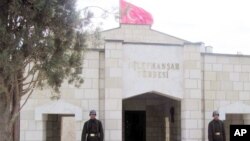A vow to defend the 700-year-old tomb of Suleyman Shah, grandfather of the founder of the Ottoman Empire, in a Turkish enclave in northern Syria could decide Turkey's role in the military campaign against Islamic State militants.
Deputy Prime Minister Bulent Arinc said on Tuesday that the militants were advancing on the white stone mausoleum, guarded by several dozen Turkish soldiers and perched on a manicured lawn under a Turkish flag on the banks of the Euphrates.
The tomb was made Turkish territory under a treaty signed with France in 1921, when France ruled Syria. Ankara regards it as sovereign territory and has repeatedly made clear that it will defend the mausoleum if it is attacked.
“We can't leave that place, which is ours through agreements, unprotected. Regardless of pride, this is important for our historical memory,” said Ilber Ortayli, a leading Turkish historian at Istanbul's Galatasaray University.
"This is important for everyone, not just for Turks," Ortayli siad.
On sidelines of IS fight
Turkey has so far been reluctant to take an active role in the U.S.-led military campaign against Islamic State militants, but the government on Tuesday sent a proposal to parliament to beef up its powers to order cross-border operations in Syria and Iraq.
Prime Minister Ahmet Davutoglu, foreign minister at the time, said in March Turkey would retaliate against any attack on the tomb, 30 kilometers (20 miles) from the Turkish border, as the Islamic State group tightened its grip on surrounding areas.
Islamic State fighters and other Islamist groups, whose strict Salafi interpretation of Islam deems the veneration of tombs to be idolatrous, have destroyed several tombs and mosques in Syria.
Suleyman Shah was the grandfather of Osman I who founded the Ottoman Empire in 1299.
Traveling through modern-day Syria with the Kayi tribe, Shah fell off his horse and drowned in the Euphrates near Ja'bar, south of the current site of the mausoleum, according to historians.
The Kayi tribe settled in Anatolia, which became the heart of the Ottoman Empire.
History question
Other academics question how knowledgeable the average Turk is about the tomb's history and the extent to which an attack on it by Islamic State fighters would spark popular support for a Turkish military intervention.
Hasan Unal, professor of international relations at Ankara's Atilim University, said the government could play it either way.
“It would depend largely on how the government presents it," Unal said. "If it had a serious intention to take part in the war, the tomb would look to have greater significance. ... But if it didn't, it could downgrade its significance in the public eye."
The tomb also made news in March when it cropped up in a leaked audio recording on YouTube of top security officials, including Davutoglu and intelligence chief Hakan Fidan, discussing possible military action in Syria.
The conversation appeared to center on a possible operation to defend the tomb as a pretext for a military incursion.
President Tayyip Erdogan, then prime minister, called the leaks “villainous” and temporarily shut down YouTube in response.





